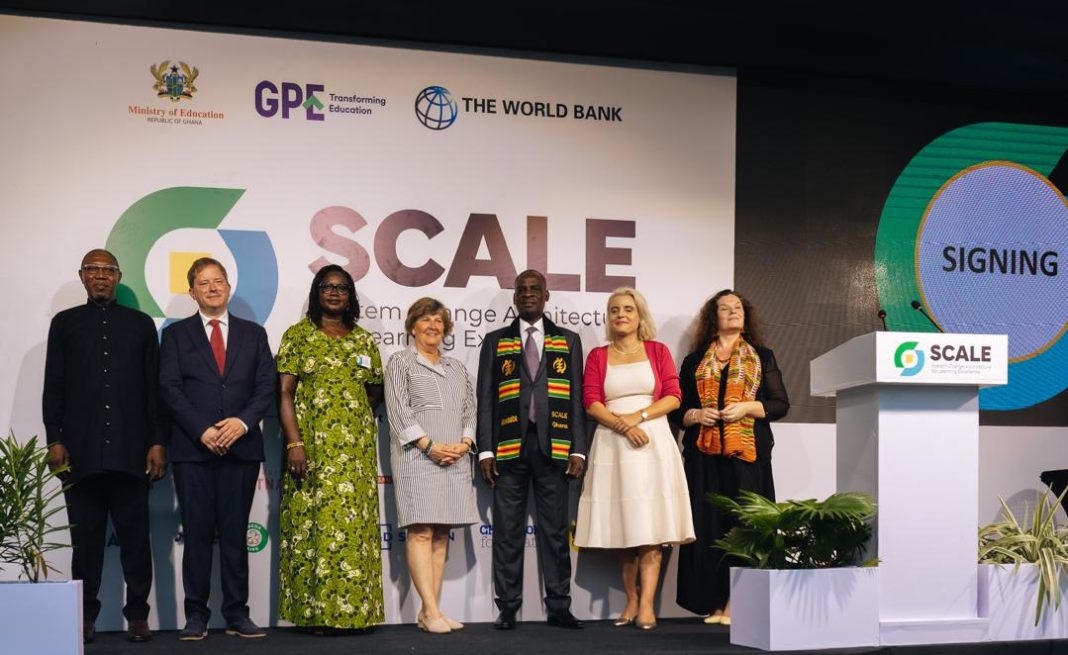By Gifty Amofa
Accra, May 29, GNA – Mr Haruna Iddrisu, Minister of Education, has signed a US$80million partnership agreement with System Change Architecture for Learning Excellence (SCALE) consortium to strengthen education.
The new US$80 million follows additional grants worth US$38.8 million, meaning a total of US$118.8 million supplementary financing will now be invested in the Ministry of Education’s flagship Ghana Accountability for Learning Outcomes Project (GALOP).
Mr Iddrisu, signing the agreement, said it was an opportunity for Ghana to advantage of a shared vision, a shared partnership, and a shared innovative financing for education, adding that it could not had been done at a better time.
He said Ghana had every reason to celebrate the impact made under the investment of GALOP and SCALE is an extension of that.
SCALE’s ambition is to reform how education is structured and delivered—offering a powerful model of how education systems can be changed to improve access to quality education, he said.
“This means creating environments where children can thrive by improving the use of evidence and having a child-focused approach.”
The Minister said alongside school improvements, SCALE’s funding would support the already running Communities of Excellence programme that had been operating across many districts of Ghana.
This programme, which focuses predominantly on cocoa-growing districts, aims to empower local communities to contribute to decision making within their local education systems.
In neighboring Côte d’Ivoire and Ghana, an estimated 1.56 million children were believed to be forced to work on family-run cocoa farms but when education in these districts is prioritized, the evidence suggests that children benefit over the long-term, he said.
Analysis by the International Cocoa Initiative (ICI) showed that communities that had a high volume of schools and better quality of education had the lowest rates of child labour—especially in cocoa-growing areas as well as addressing child labor rates, the SCALE funding would also see a Ghana Education Evidence and Data Lab (GEEDLab) established within the Ministry of Education to inform the government’s approach to education policymaking and planning.

Mr Simon Sommer, Co-Chief Executive Officer (CEO) of the Jacobs Foundation, said besides the financial commitment, the SCALE partnership offered expertise of a broad range of organisations which had helped to transform the way in which evidence is applied to education.
SCALE would build on the successes of other international models, including the Child Learning and Education Facility (CLEF) in Côte d’Ivoire, which has been recognized by the World Bank.
In Ghana, we expect 2 million children to benefit from evidence-based research and insight that would extend across 100 cocoa districts, Sommer said.
Mr Tom Hall, CEO, UBS Optimus Foundation, said “We firmly believe that one of the most effective ways to give maximum impact is to act collectively.”
“Greater coordination boosts efficiency—by avoiding duplication, streamlining processes, and leveraging each partner’s unique strengths and flexibility. Together, we can overcome the limitations of working in silos and support a programme that addresses multiple root causes at once,” Hall said.
Andrea Studer, CEO, Fondation Botnar, said: “At Fondation Botnar, we believe education systems must help young people thrive together in a changing world. This means going beyond academics to support their holistic development, including wellbeing and essential life skills like empathy, resilience, and critical thinking.
“SCALE reflects this ambition by prioritising social and emotional learning, strengthening local systems, and grounding action in evidence.”
The partnership – which includes three philanthropies and over 10 cocoa and chocolate companies working alongside the Global Partnership for Education – brings US$80 million to Ghana’s education system to improve foundational learning and ensure every child receives an education, a press release copied the Ghana News Agency has said.
The investment would seek to improve foundational learning, including basic numeracy and literacy skills, support emotional and social wellbeing, and increase children’s access to education across Ghana.
The event was hosted by Simone Giger, Swiss Ambassador to Ghana, Benin, and Togo at based in Accra, with the Jacobs Foundation, Foundation Botnar, UBS Optimus Foundation, and representatives from 10 cocoa and chocolate companies that form the SCALE consortium, also in attendance.
The new US$40 million funding, the largest amount raised for education by philanthropic and private partners globally, has been doubled by the international organisation, the Global Partnership for Education (GPE), through its Multiplier Fund—meaning a combined total of US$80 million will be invested in education across Ghana.
Alongside the SCALE funding and the GPE Multiplier Grant, additional grants and funding mean a total investment of US$118.8 million will be used to strengthen inclusivity and safety in schools, improve teacher training, and prioritize the emotional and social wellbeing of children.
With an emphasis on evidence-based approaches to education, the funders behind SCALE bring a breadth of international expertise to support local, regional, and national level improvements in Ghana’s education system.
GNA
Edited by Samuel Osei-Frempong
